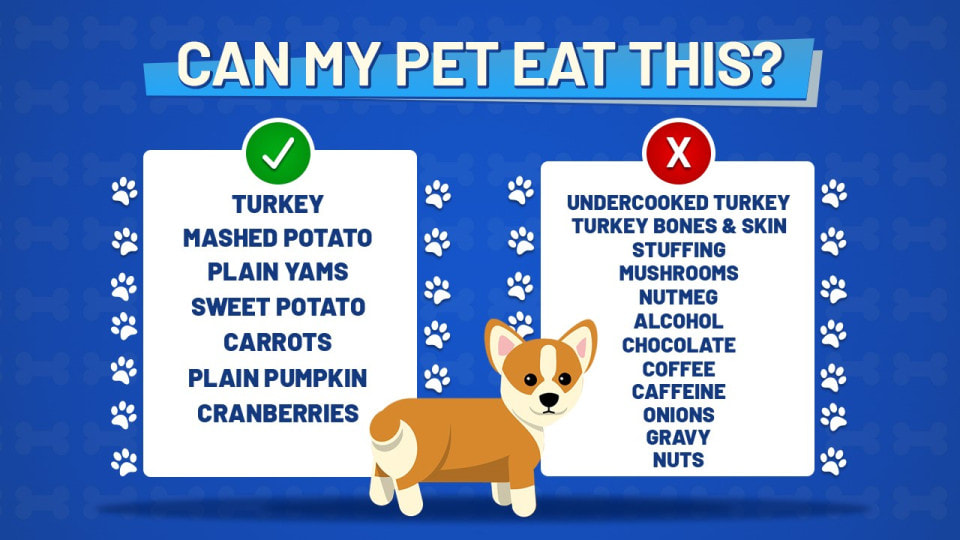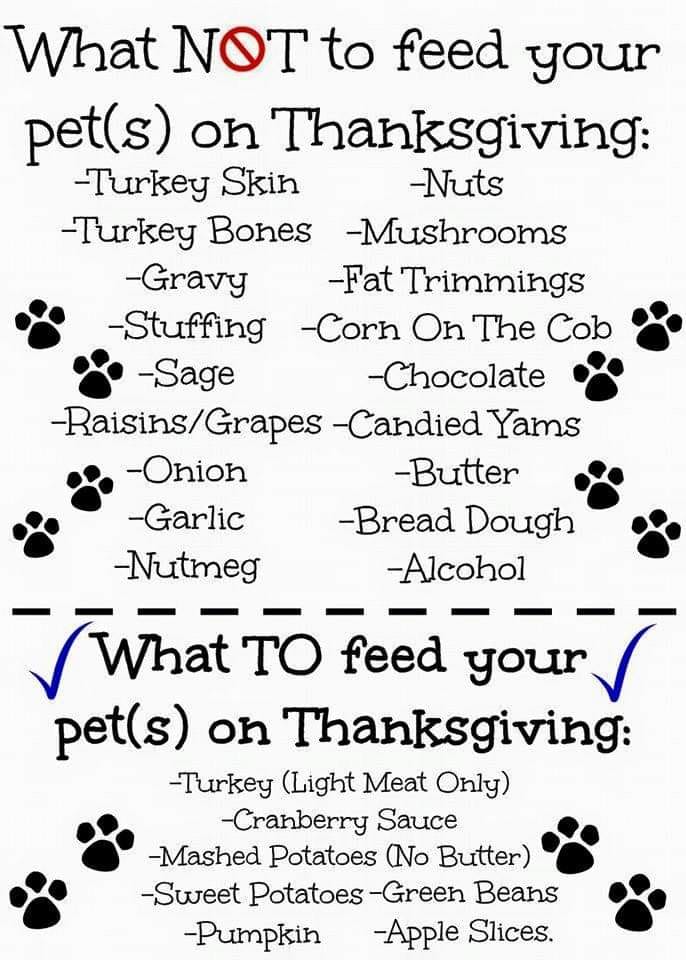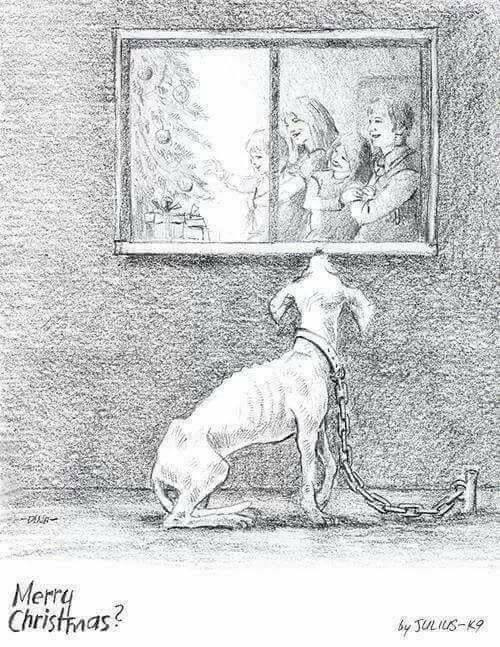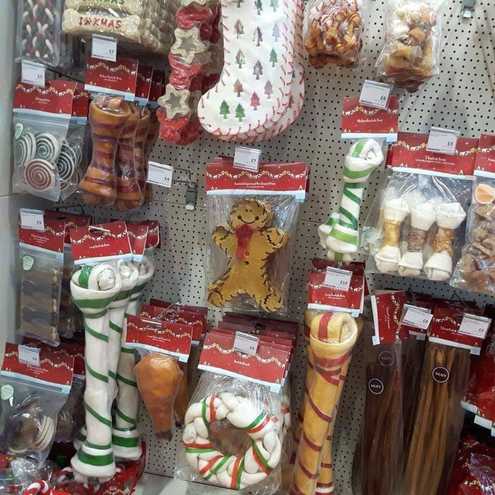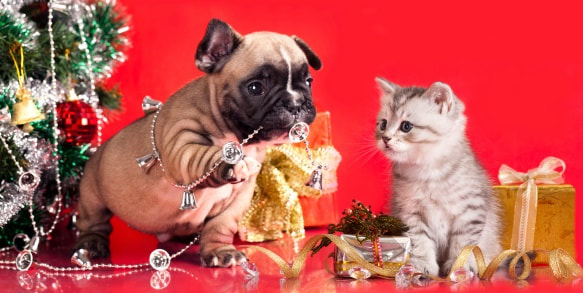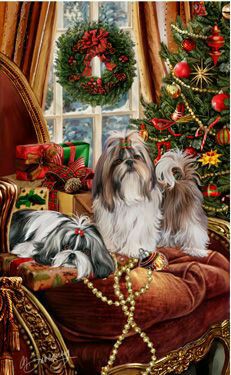Holidays and dogs
Just a Holiday warning for Pets
Batteries not included ...
It is Christmas day today,
And all are full of cheer,
But I lay freezing on the step,
I always sleep right here.
I never get to go inside,
And join in all the fun,
I'm what they call a yard dog,
When all is said and done.
They have given me some scraps,
I think it was last week,
Now laying in the snow today,
I am feeling tired and weak.
I can hear the children playing,
As my head lay on my paws,
This time just last year,
I was a gift from Santa Claus.
I don't know what I did wrong,
To be shut out in the yard,
I only lived inside 6 months,
Since then my life's been hard.
The snow is falling heavy now,
I'm just a block of ice,
And when I breathe the cold cold air,
My lungs feel like a vice.
A miracle then came to pass,
An Angel did appear,
She glowed,and I could feel the heat,
As she floated near.
She reached her hand and beckoned,
It was such a sight to see,
She smiled and said "Good Dog,
It is time to come with me.
I will take you to the bridge,
Where all the Good Dogs go
You can play there in the sunshine,
There will be no freezing snow."
My bag of bones stood up then,
I shook the snow from off my fur,
And,as I slowly followed,
This is what I said to her.
"I am not a Good Dog though,
In that I think you're wrong,
No one would shut a Good Dog,
In the garden for so long."
The Angel turned and smiled,
As I walked with head hung low,
Then she said"I'm sorry,
I thought that you would know.
You really are a Good Dog,
The reason why your time is up,
It is just unfortunate,
You were born a Christmas pup."
I now live at the Rainbow Bridge,
And I am filled with joy,
But remember this at Christmas time,
A dog is NOT a toy.
To clarify this message,
To which I have eluded,
Animals are living things,
Batteries are not included ❤️
~ Author Unknown
It is Christmas day today,
And all are full of cheer,
But I lay freezing on the step,
I always sleep right here.
I never get to go inside,
And join in all the fun,
I'm what they call a yard dog,
When all is said and done.
They have given me some scraps,
I think it was last week,
Now laying in the snow today,
I am feeling tired and weak.
I can hear the children playing,
As my head lay on my paws,
This time just last year,
I was a gift from Santa Claus.
I don't know what I did wrong,
To be shut out in the yard,
I only lived inside 6 months,
Since then my life's been hard.
The snow is falling heavy now,
I'm just a block of ice,
And when I breathe the cold cold air,
My lungs feel like a vice.
A miracle then came to pass,
An Angel did appear,
She glowed,and I could feel the heat,
As she floated near.
She reached her hand and beckoned,
It was such a sight to see,
She smiled and said "Good Dog,
It is time to come with me.
I will take you to the bridge,
Where all the Good Dogs go
You can play there in the sunshine,
There will be no freezing snow."
My bag of bones stood up then,
I shook the snow from off my fur,
And,as I slowly followed,
This is what I said to her.
"I am not a Good Dog though,
In that I think you're wrong,
No one would shut a Good Dog,
In the garden for so long."
The Angel turned and smiled,
As I walked with head hung low,
Then she said"I'm sorry,
I thought that you would know.
You really are a Good Dog,
The reason why your time is up,
It is just unfortunate,
You were born a Christmas pup."
I now live at the Rainbow Bridge,
And I am filled with joy,
But remember this at Christmas time,
A dog is NOT a toy.
To clarify this message,
To which I have eluded,
Animals are living things,
Batteries are not included ❤️
~ Author Unknown
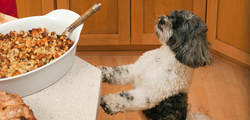
Thanksgiving is a time for friends, family and holiday feasts—but also a time for possible distress for our animal companions. Pets won’t be so thankful if they munch on undercooked turkey or a pet-unfriendly floral arrangement, or if they stumble upon an unattended alcoholic drink. Check out the following tips for a fulfilling Thanksgiving that your pets can enjoy, too: Talkin’ Turkey: If you decide to feed your pet a small bite of turkey, make sure it’s boneless and well-cooked. Don't offer her raw or undercooked turkey, which may contain salmonella bacteria. Do not give your pet the left over carcass–the bones can be problematic for the digestive tract. No Bread Dough: Don't spoil your pet’s holiday by giving him access to raw yeast bread dough. When a dog or cat ingests raw bread dough, the yeast continues to convert the sugars in the dough to carbon dioxide gas and alcohol. This can result in bloated drunken pets, which could become a life-threatening emergency, requiring hospitalization. Don't Let Them Eat Cake: If you plan to bake Thanksgiving desserts, be sure your pets keep their noses out of the batter, especially if it includes raw eggs—they could contain salmonella bacteria that may lead to food poisoning. A Feast Fit for a King: While your family enjoys a special meal, give your cat and dog a small feast of their own. Offer them made-for-pets chew bones. Or stuff their usual dinner—perhaps with a few added tidbits of turkey, vegetables (try sweet potato or green beans) and dribbles of gravy—inside a food puzzle toy. They’ll be happily occupied for awhile, working hard to extract their dinner from the toy. A few small boneless pieces of cooked turkey, a taste of mashed potato or even a lick of pumpkin pie shouldn’t pose a problem. However, don't allow your pets to overindulge, as they could wind up with a case of stomach upset, diarrhea or even worse—an inflammatory condition of the pancreas known as pancreatitis. In fact, it’s best keep pets on their regular diets during the holidays. Thanks from the ASPCA
ASPCA Animal Poison Control Center Phone Number: (888) 426-4435
Our Animal Poison Control Center experts have put together a handy list of the top toxic people foods to avoid feeding your pet. As always, if you suspect your pet has eaten any of the following foods, please note the amount ingested and contact your veterinarian or the ASPCA Animal Poison Control Center at (888) 426-4435.
Alcohol
Alcoholic beverages and food products containing alcohol can cause vomiting, diarrhea, decreased coordination, central nervous system depression, difficulty breathing, tremors, abnormal blood acidity, coma and even death. Under no circumstances should your pet be given any alcohol. If you suspect that your pet has ingested alcohol, contact your veterinarian or the ASPCA Animal Poison Control Center immediately.
Avocado
Avocado is primarily a problem for birds, rabbits, donkeys, horses, and ruminants including sheep and goats. The biggest concern is for cardiovascular damage and death in birds. Horses, donkeys and ruminants frequently get swollen, edematous head and neck.
Chocolate, Coffee and Caffeine
These products all contain substances called methylxanthines, which are found in cacao seeds, the fruit of the plant used to make coffee, and in the nuts of an extract used in some sodas. When ingested by pets, methylxanthines can cause vomiting and diarrhea, panting, excessive thirst and urination, hyperactivity, abnormal heart rhythm, tremors, seizures and even death. Note that darker chocolate is more dangerous than milk chocolate. White chocolate has the lowest level of methylxanthines, while baking chocolate contains the highest.
Citrus
The stems, leaves, peels, fruit and seeds of citrus plants contain varying amounts of citric acid, essential oils that can cause irritation and possibly even central nervous system depression if ingested in significant amounts. Small doses, such as eating the fruit, are not likely to present problems beyond minor stomach upset.
Coconut and Coconut Oil
When ingested in small amounts, coconut and coconut-based products are not likely to cause serious harm to your pet. The flesh and milk of fresh coconuts do contain oils that may cause stomach upset, loose stools or diarrhea. Because of this, we encourage you to use caution when offering your pets these foods. Coconut water is high in potassium and should not be given to your pet.
Grapes and Raisins
Although the toxic substance within grapes and raisins is unknown, these fruits can cause kidney failure. Until more information is known about the toxic substance, it is best to avoid feeding grapes and raisins to dogs.
Macadamia Nuts
Macadamia nuts can cause weakness, depression, vomiting, tremors and hyperthermia in dogs. Signs usually appear within 12 hours of ingestion and can last approximately 12 to 48 hours.
Milk and Dairy
Because pets do not possess significant amounts of lactase (the enzyme that breaks down lactose in milk), milk and other dairy-based products cause them diarrhea or other digestive upset.
Nuts
Nuts, including almonds, pecans, and walnuts, contain high amounts of oils and fats. The fats can cause vomiting and diarrhea, and potentially pancreatitis in pets.
Onions, Garlic, Chives
These vegetables and herbs can cause gastrointestinal irritation and could lead to red blood cell damage. Although cats are more susceptible, dogs are also at risk if a large enough amount is consumed. Toxicity is normally diagnosed through history, clinical signs and microscopic confirmation of Heinz bodies.
Raw/Undercooked Meat, Eggs and Bones
Raw meat and raw eggs can contain bacteria such as Salmonella and E. coli that can be harmful to pets and humans. Raw eggs contain an enzyme called avidin that decreases the absorption of biotin (a B vitamin), which can lead to skin and coat problems. Feeding your pet raw bones may seem like a natural and healthy option that might occur if your pet lived in the wild. However, this can be very dangerous for a domestic pet, who might choke on bones, or sustain a grave injury should the bone splinter and become lodged in or puncture your pet’s digestive tract.
Salt and Salty Snack Foods
Large amounts of salt can produce excessive thirst and urination, or even sodium ion poisoning in pets. Signs that your pet may have eaten too many salty foods include vomiting, diarrhea, depression, tremors, elevated body temperature, seizures and even death. As such, we encourage you to avoid feeding salt-heavy snacks like potato chips, pretzels, and salted popcorn to your pets.
Xylitol
Xylitol is used as a sweetener in many products, including gum, candy, baked goods and toothpaste. It can cause insulin release in most species, which can lead to liver failure. The increase in insulin leads to hypoglycemia (lowered sugar levels). Initial signs of toxicosis include vomiting, lethargy and loss of coordination. Signs can progress to seizures. Elevated liver enzymes and liver failure can be seen within a few days.
Yeast Dough
Yeast dough can rise and cause gas to accumulate in your pet’s digestive system. This can be painful and can cause the stomach to bloat, and potentially twist, becoming a life threatening emergency. The yeast produce ethanol as a by-product and a dog ingesting raw bread dough can become drunk (See alcohol).
Our Animal Poison Control Center experts have put together a handy list of the top toxic people foods to avoid feeding your pet. As always, if you suspect your pet has eaten any of the following foods, please note the amount ingested and contact your veterinarian or the ASPCA Animal Poison Control Center at (888) 426-4435.
Alcohol
Alcoholic beverages and food products containing alcohol can cause vomiting, diarrhea, decreased coordination, central nervous system depression, difficulty breathing, tremors, abnormal blood acidity, coma and even death. Under no circumstances should your pet be given any alcohol. If you suspect that your pet has ingested alcohol, contact your veterinarian or the ASPCA Animal Poison Control Center immediately.
Avocado
Avocado is primarily a problem for birds, rabbits, donkeys, horses, and ruminants including sheep and goats. The biggest concern is for cardiovascular damage and death in birds. Horses, donkeys and ruminants frequently get swollen, edematous head and neck.
Chocolate, Coffee and Caffeine
These products all contain substances called methylxanthines, which are found in cacao seeds, the fruit of the plant used to make coffee, and in the nuts of an extract used in some sodas. When ingested by pets, methylxanthines can cause vomiting and diarrhea, panting, excessive thirst and urination, hyperactivity, abnormal heart rhythm, tremors, seizures and even death. Note that darker chocolate is more dangerous than milk chocolate. White chocolate has the lowest level of methylxanthines, while baking chocolate contains the highest.
Citrus
The stems, leaves, peels, fruit and seeds of citrus plants contain varying amounts of citric acid, essential oils that can cause irritation and possibly even central nervous system depression if ingested in significant amounts. Small doses, such as eating the fruit, are not likely to present problems beyond minor stomach upset.
Coconut and Coconut Oil
When ingested in small amounts, coconut and coconut-based products are not likely to cause serious harm to your pet. The flesh and milk of fresh coconuts do contain oils that may cause stomach upset, loose stools or diarrhea. Because of this, we encourage you to use caution when offering your pets these foods. Coconut water is high in potassium and should not be given to your pet.
Grapes and Raisins
Although the toxic substance within grapes and raisins is unknown, these fruits can cause kidney failure. Until more information is known about the toxic substance, it is best to avoid feeding grapes and raisins to dogs.
Macadamia Nuts
Macadamia nuts can cause weakness, depression, vomiting, tremors and hyperthermia in dogs. Signs usually appear within 12 hours of ingestion and can last approximately 12 to 48 hours.
Milk and Dairy
Because pets do not possess significant amounts of lactase (the enzyme that breaks down lactose in milk), milk and other dairy-based products cause them diarrhea or other digestive upset.
Nuts
Nuts, including almonds, pecans, and walnuts, contain high amounts of oils and fats. The fats can cause vomiting and diarrhea, and potentially pancreatitis in pets.
Onions, Garlic, Chives
These vegetables and herbs can cause gastrointestinal irritation and could lead to red blood cell damage. Although cats are more susceptible, dogs are also at risk if a large enough amount is consumed. Toxicity is normally diagnosed through history, clinical signs and microscopic confirmation of Heinz bodies.
Raw/Undercooked Meat, Eggs and Bones
Raw meat and raw eggs can contain bacteria such as Salmonella and E. coli that can be harmful to pets and humans. Raw eggs contain an enzyme called avidin that decreases the absorption of biotin (a B vitamin), which can lead to skin and coat problems. Feeding your pet raw bones may seem like a natural and healthy option that might occur if your pet lived in the wild. However, this can be very dangerous for a domestic pet, who might choke on bones, or sustain a grave injury should the bone splinter and become lodged in or puncture your pet’s digestive tract.
Salt and Salty Snack Foods
Large amounts of salt can produce excessive thirst and urination, or even sodium ion poisoning in pets. Signs that your pet may have eaten too many salty foods include vomiting, diarrhea, depression, tremors, elevated body temperature, seizures and even death. As such, we encourage you to avoid feeding salt-heavy snacks like potato chips, pretzels, and salted popcorn to your pets.
Xylitol
Xylitol is used as a sweetener in many products, including gum, candy, baked goods and toothpaste. It can cause insulin release in most species, which can lead to liver failure. The increase in insulin leads to hypoglycemia (lowered sugar levels). Initial signs of toxicosis include vomiting, lethargy and loss of coordination. Signs can progress to seizures. Elevated liver enzymes and liver failure can be seen within a few days.
Yeast Dough
Yeast dough can rise and cause gas to accumulate in your pet’s digestive system. This can be painful and can cause the stomach to bloat, and potentially twist, becoming a life threatening emergency. The yeast produce ethanol as a by-product and a dog ingesting raw bread dough can become drunk (See alcohol).
Just a little warning regarding the Xmas treat many stores are now starting to stock for dogs at xmas. Many of these so called treats end up with the dog "enjoying" some time in a veterinary surgery over Christmas. The vast majority of these rawhide products and treats come from China. The chews are made from cattle or horse hides and their journey starts with the hides being soaked in a toxic sodium sulphide to remove the hair and fat. More chemicals are used in order to split the hide into layers which is then washed with hydrogen peroxide to give the white "pure" look and remove the rancid smell.
Now comes the pretty festive colors and the glue to form cute shapes.
On testing, these chews have shown traces of arsenic, mercury, chromium and formaldehyde. If that wasn't bad enough, they regularly cause intestinal blockages, poisoning from chemical residue and choking.
The chews go slippery when wet and are near impossible to get hold of to save a choking dog. Leave them in the shop where they belong or if some well meaning person buys them for your dog put them safely away for later, then dispatch in the bin! Please be safe with your dogs!
Buy an Elk antler instead.
Preventive Measures Can Save Pets
The holidays are a festive time for us and our pets. However, due to ongoing activities and constant distractions, we can easily overlook potential dangers to our four-legged family members.
Take preventive measures to protect your pets this holiday season. Being aware of these top five dangers could save you a trip to the veterinary emergency room.
1. Holiday Tinsel and Ornaments Tinsel, while not toxic, is very attractive to pets, particularly cats. The shiny, dangling decoration reflects light and can move in the slightest draft — appearing to come alive to watchful critters.
The problem with tinsel is that once it’s consumed, it can cause serious injury to your pet. If not caught in time, this foreign body ingestion could actually be fatal as it twists and bunches inside your pet’s intestines. Immediate veterinary care is required.
In addition, bright and colorful tree ornaments can attract your pet’s curiosity. Place glass, aluminum and paper ornaments higher up on the tree. Pets can chew and swallow these fragile objects and not only can broken pieces form sharp edges that may lacerate your pet’s mouth, throat and intestines, they could also create a choking hazard.
2. Holiday Lighting and Candles Twinkling, shiny and dangling holiday lights — such as the icicle, netting, garland, curtain, rope and candle varietal — may be another source of danger to your curious pets.
Got a pet that likes to chew? Electrical shock may occur when a pet chomps down on an electrical cord, causing tongue lacerations and possible death. Check your holiday lights for signs of fraying or chewing and use a grounded three-prong extension cord as a safety precaution.
If you have candles on display, place them in a hard-to-reach spot so that your pets can not access them. Not only can pets seriously burn themselves, but knocking over candles creates a fire hazard and may leave a trail of hot wax that will easily burn the pads of paws and more.
3. Gift Wrap Ribbon .You may be tempted to fashion your pet with a decorative ribbon “collar” but beware that this could become a choking hazard.
Also, it’s best to quickly discard ribbons and bows wrapped around holiday gifts so that your curious companions won’t be enticed to chew or swallow them. Ingested ribbon can cause a choking hazard and ultimately twist throughout the intestines, leading to emergency surgery and even death.
Toxic Holiday Plants
They may be pretty, but some holiday plants are poisonous—even deadly. As little as a single leaf from any lily variety is lethal to cats. Others to avoid:
- Christmas tree pine needles can produce oral irritation, vomiting, diarrhea, lethargy, trembling and posterior weakness.
- Holly, commonly found during the Christmas season, can cause intense vomiting, diarrhea and depression.
- Mistletoe, another Christmas plant, can cause significant vomiting and diarrhea, difficulty breathing, collapse, erratic behavior, hallucinations and death when ingested.
- Poinsettia, contrary to popular belief, is not deadly; however, it can cause irritation to the mouth and stomach and sometimes vomiting if a large quantity has been consumed.
